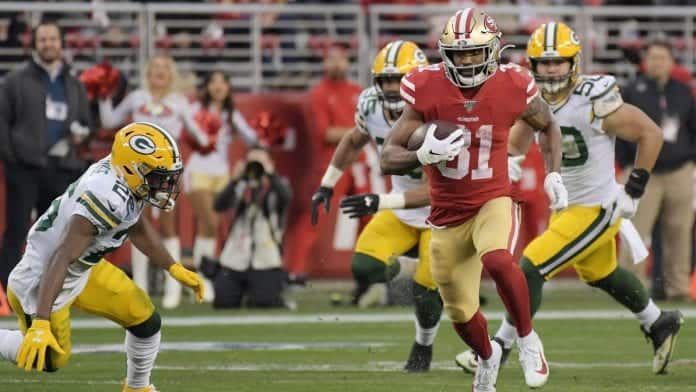The NFC Championship Game is over, and San Francisco 49ers running back Raheem Mostert has written his name in the NFL record books. The former undrafted free agent totaled 220 yards and four touchdowns at an astonishing 7.6 yards per carry, setting the NFC Championship record for most rushing yards in a game. The Green Bay Packers didn’t have an answer for him, and the 49ers knew it. They ran 51 plays in the NFC Championship, and Mostert carried the football on 29 of them. His rushing yards accounted for 62% of San Francisco’s total offense. When you add in a couple of first-half turnovers, it is no surprise that Green Bay was already being blown out at halftime. However, there was more to Mostert’s success than initially meets the eye.
Analyzing Mostert’s NFC Championship performance using the OSM
The PFN Offensive Share Metric (OSM) was created to measure how much of a player’s statistical performance they were directly responsible for. Despite his statistical dominance, Mostert did not score particularly well on this metric. With an OSM grade of just 15.77, he graded behind both Aaron Jones and Derrick Henry on Sunday, implying that both players contributed more to their offensive success than Mostert did. That might come as a surprise to many of you because Mostert significantly outproduced both players during championship weekend. For once, the explanation for this statistical curiosity is reasonably simple: both Jones and Henry faced far more resistance than Mostert did on their rushing attempts.
We know this because the NFL keeps track of how often opposing defenses had eight or more defenders in the box while a specific running back is on the field. Jones and Henry were in that situation 33.33% and 36.84% of the time, respectively. Those are relatively high percentages, and you would expect the two running backs to have reduced production. Meanwhile, when Mostert was on the field in the NFC Championship game, the Packers only had eight or more defenders in the box 13.79% of the time, a remarkably low number given how often Mostert was handed the ball and how successful he was throughout the game.
For some context that shows just how strange this decision was, when Green Bay played the Seattle Seahawks in the Divisional Round, the primary running back they faced was Marshawn Lynch. He had recently come out of retirement, and against the Packers, he was barely a threat, averaging just 2.2 yards per carry. And yet, Pettine stacked the box against him more often than he did against Mostert, at 16.67% of the time. The decision to give Mostert so much room to run is confusing, to say the least, and really is what allowed him to dominate the NFC Championship.
In short, while Mostert absolutely made the most of what he was given, Jones and Henry were in significantly worse situations. Put another way, Mostert’s OSM grade was relatively low not because he played poorly, but rather because the Green Bay defense made things too easy for him.
How Mike Pettine enabled Mostert’s success
Most of the blame for Mostert’s dominance in the NFC Championship game can be placed squarely at the feet of the Packers defensive coordinator, Mike Pettine. Pettine and 49ers head coach Kyle Shanahan have worked together in the past; in 2014, when Pettine was the head coach of the Cleveland Browns, Shanahan was his offensive coordinator. Apparently, Shanahan still remembers some of his old boss’ tendencies because in both games between the two this season, Pettine’s defense has looked completely helpless, allowing 37 points in each. And while the first game may have had a more lopsided score, the rematch was arguably worse for Pettine, because he knew precisely what Shanahan wanted to do. Jimmy Garoppolo only attempted eight passes in the entire game; there was no mystery in their game plan. Even so, Pettine wasn’t able to make the appropriate in-game adjustments.
To be fair to Pettine, committing harder against the run wouldn’t have solved all of the Packers problems. Shanahan is one of the best offensive minds in the NFL right now, and he would almost certainly have adjusted his own game plan in response. There was a genuine risk that if Green Bay overcommitted to stopping Mostert, Jimmy Garoppolo would have torched their secondary. But at a certain point, you need to recognize that your current strategy is failing so badly that any alternative would be an improvement. Pettine’s failure to acknowledge this fact bodes poorly for his future defenses. After all, the ability to adapt on the fly is arguably the most important skill a coach can have, and on Sunday night Pettine’s failures in this area ended up gifting the NFC Championship to Mostert and San Francisco.

